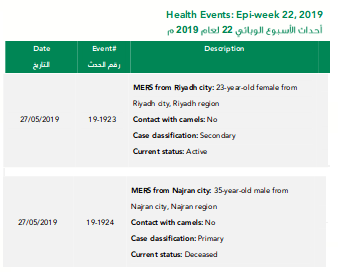#14,093
Yesterday, in Saudi MOH: 3 MERS Cases (2 Deceased), we saw Epi Week #22 begin with two cases, both deceased, with one from Riyadh and the other from Medina.
Whenever we see cases initially announced as deceased, it raises the question as to exactly when they were diagnosed and isolated, as this increases the risks of both household, and nosocomial transmission (see J. Inf. Pub. Health: Diagnostic Delays in MERS Coronavirus Patients & Health Systems).We've looked at some of the challenges in diagnosing MERS coronavirus infection before, including atypical presentations, intermittent-positive test results, potential transmission from asymptomatic cases, and an unreliable algorithm used by the Saudis for screening patients.
Because of the difficulties in identifying cases, the WHO continues to advise:
It is not always possible to identify patients with MERS-CoV early because like other respiratory infections, the early symptoms of MERS-CoV are non-specific. Therefore, healthcare workers should always apply standard precautions consistently with all patients, regardless of their diagnosis.
Droplet precautions should be added to the standard precautions when providing care to patients with symptoms of acute respiratory infection; contact precautions and eye protection should be added when caring for probable or confirmed cases of MERS-CoV infection; airborne precautions should be applied when performing aerosol generating procedures.
Today's MOH report contains two more cases; a secondary case (23,F) in Riyadh, who may be linked to any one of several recent cases in the Capital, and for the third time in 2 days, another deceased case (35, M), this time from Najran.
While MERS-CoV hasn't taken off the way that SARS-CoV did 16 years ago, we've seen studies (see A Pandemic Risk Assessment Of MERS-CoV In Saudi Arabia) suggesting the virus doesn't have all that far to evolve before it could pose a genuine global threat.
A little over year ago in the WHO List Of Blueprint Priority Diseases, we saw MERS-CoV listed among the 8 disease threats in need of urgent accelerated research and development.Among the tools needed are faster, and more accurate diagnostic tests, and an effective armamentarium of drugs and/or vaccines. Unless and until they become available, MERS is likely to continue to spark household and nosocomial outbreaks and remain a serious public health concern.

